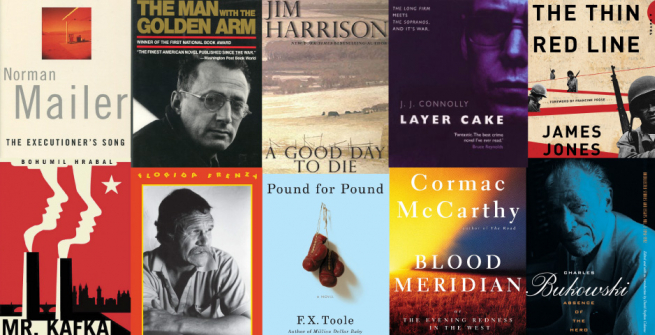The novels and poetry of Charles Bukowski continue to have devoted, admiring fans, who can never get enough of his books. We have those books in hard copy, and there is a good representation in Overdrive: The Charles Bukowski Fiction Collection and Charles Bukowski.
German by birth, as a young boy Bukowski was taunted for his origins and accent, for his physical appearance (a severe case of acne that left his face visibly scarred) and his clothing. He grew up with a physically and verbally abusive father. Excessive alcohol use dulled the pain but illuminated a life of writing. Bukowski graduated from Los Angeles High School, attended Los Angeles City College, and worked many blue-collar jobs. During World War II he spent several days in prison for draft evasion, failed the psychological test required for military service, and was given a 4-F.
In so many ways Bukowski’s life was miserable and had all the markings for him to become some type of criminal. He found a form of reconciling his personal life by writing, where he could vent his anger and fury. Do not even think about political correctness, let alone kindness in his work. Even his poetry book about cats, creatures he loved, is at times tinged with hard-edged nastiness.
He is among other tough-guy writers whose works rage with hostility and discontent, but offer insights into what life is like for those who are outsiders—always on the edge. Like Bukowski, they had dreadful lives: childhood bullying, abusive family treatment with authoritarian fathers, getting by on zilch, drug and alcohol addictions, immigrants with minimal schooling, and quite a few experienced war-time military service.
The books are not quite gangster or sociopathic, but verge on those themes. Some writing has more literary appeal, but all of the books are honest and true in how deprivation, desolation, and anger are represented in stories about people’s lives. These books are not for everyone. The men who wrote them are able to present readers with an awareness of life that is hopeless, out of control and teetering on disaster.
If some of you thought Ernest Hemingway was one tough dude, forget it, his writing style and subject matter are lyrical compared to the books of others who wrote on the wild side: Nelson Algren, William Burroughs, Harry Crews, James Ellroy, John Fante, Jean Genet, Jim Harrison, Bohumil Hrabal, James Jones, Danilo Kiš, Cormac McCarthy, Norman Mailer, Henry Miller, Hunter S. Thompson, Jim Thompson, Andrew Vachss.
Tough Guys, Tough Reads
Blood Meridian
Cormac McCarthy uses the border of Texas and Mexico as the setting to depict the brutal history of the West. The novel is based on real events in the 1850s, where there were bounties for the scalps of massacred Native Americans.
The Executioner's Song
Based on the real-life drama surrounding the execution of convicted murderer Gary Gilmore, Mailer created a three-part novel that peeled back issues of violence and the death penalty.
Florida Frenzy
A collection of essays and fiction by Harry Crews that covers a wide range of subjects from cockfighting, caring for injured animals, hard drinking and poaching gators.
A Good Day to Die
Three people buy a case of dynamite to save the Grand Canyon from being wrecked by a proposed dam. A poet who loves fishing, a Vietnam veteran with addiction issues, and a woman who might love either of the men, set out from Florida to accomplish this deed.
The Grifters
Being on the grift outweighs any warm, fuzzy feelings between mother and son con artists, who are on opposite sides of the game.
Pound for Pound: A Novel
The posthumously published novel of X. J. Toole, whose novel, Million Dollar Baby, was made into the eponymous Oscar-winning film. Set within the brutal and corrupt world of boxing, this novel is about a deeply troubled boxing trainer who takes on a young boxer.
The Thin Red Line
Jones is best known for From Here to Eternity, and several other books about war, but this book is far more raw in its representation of men at the battlefront.
Layer Cake
A drug dealer, who plans to retire, gets involved in one last job that pulls him into the complex world of London’s web of organized crime.
Mr. Kafka and Other Tales From the Time of the Cult
These raucous, surreal stories are set in 1950s Czechoslovakia, which was part of the Eastern Bloc, and the cult is a direct reference to Stalinist repression. Life is so absurd that even Kafka’s works might seem realistic. Hrabal is best known for Closely Watched Trains, which was made into a film.
The Man With the Golden Arm
World War II veteran Frankie the Machine tries to overcome a heroin addiction that resulted from being given morphine for a war wound. Algren’s grim portrayal of Chicago’s walking wounded won the National Book Award in 1950.
Never a Lovely So Real: The Life and Work of Nelson Algren
This thoroughly researched biography reveals why the writer became a recluse at the height of a successful career, his early hard-luck life, and disastrous relationships, especially one with Simone de Beauvoir. Colin Asher’s access to the 886-page F.B.I.file on Algren clears up why Algren was being watched during the Red Scare.











